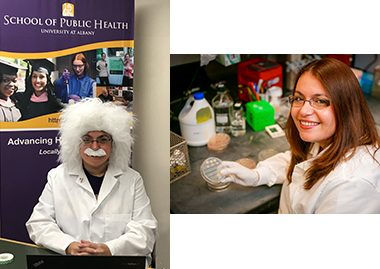A Scientist Looks Just Like You!
 |
|
Biomedical scientist Magdia De Jesus, seen at right in her usual laboratory look, and, at left, portraying an older researcher of some note. (Photo at right by Mike Wren)
|
ALBANY, N.Y. (December 4, 2017) — Magdia De Jesus donned her white wig and mustache and clicked the link. She was excited but unsure of what to expect from the class of seventh graders at Northeast Middle School in Bristol, Conn. As the connection established, the students got their first glimpse of De Jesus dressed as Albert Einstein and laughter erupted.
The assistant professor of Biomedical Sciences was launching her first Skype a Scientist session and wanted to convey the message, “A scientist looks just like you.” After introducing herself, she removed the wig and mustache.
“I love that she tackled the idea of what a ‘scientist’ looks like. I think it’s a powerful message,” said Becky Bottino, a Northeast Middle School science teacher, whose class was the inaugural recipients of De Jesus’s presentation.
De Jesus signed up online for the Skype a Scientist program, which matches scientists with classrooms around the world. A scientist Skypes into the classroom for 30-60 minute Q&A sessions that cover his or her expertise or what it’s like to be a scientist.
It’s also classic irony given that De Jesus received her master’s and Ph.D. in microbiology and immunology at the Albert Einstein College of Medicine in the Bronx.
Before the call, Bottino prepped the students by providing them with background information on De Jesus and her work in the lab. The class is scheduled to learn about the intestines and microbes later in the year, so the session gave them an opportunity to get a little "taste" of anatomy/biology.
It was a perfect fit, as De Jesus researches the intestinal immune system at both the School of Public Health on the Health Sciences Campus and the state’s Wadsworth Center. She studies the understanding of how the gut recognizes all sorts of microbes, specifically fungi.
“I recently wrote an NSF grant to engage with school districts in the Albany and Western New York regions,” said De Jesus. “Believe it or not, there’s a lot of schools that don’t have access to science.”
De Jesus points to the country’s desire to increase diversity in the STEM fields. However, the Native American community comprises only 2 percent of the U.S. population, and only 0.3 percent of those actually go into STEM fields.
Her grant includes engaging with districts via a three-part program: first, she would go into the classroom dressed up as Einstein to show students that a scientist can look like anyone; then, she talks with the students about the intestinal immune system and how important it is; and finally, she assigns them a research project on the intestinal mucosa, with whatever microbe they choose. She would return a month later to hear the students present their findings.
“Why Einstein?” quipped De Jesus. “Well, a lot of people know Einstein as a brilliant scientist, but he’s white, male and a stereotypical image of a scientist. My idea is to show them that a scientist can also be female or even a minority.”
The students were thoroughly engaged and asked questions such as “Is it worth the years of schooling?”, “What was your greatest research find?”, and “What advice would you give a student interested in pursuing this work?”
“It was such a wonderful experience to connect with a real scientist,” said Bottino. “The students found Dr. De Jesus to be very funny and informative. Her research is fascinating and it was so interesting to hear about the technology at the University at Albany.”
“It doesn’t matter where you come from, it’s your passion and love for something like science that could show them that they could also be a scientist,” concluded De Jesus.
For more on De Jesus’s work, visit www.wadsworth.org/senior-staff/magdia-dejesus or www.wadsworth.org/research/laboratories/dejesus.
![]() For more news, subscribe to UAlbany's RSS headline feeds
For more news, subscribe to UAlbany's RSS headline feeds
A comprehensive public research university, the University at Albany-SUNY offers more than 120 undergraduate majors and minors and 125 master's, doctoral and graduate certificate programs. UAlbany is a leader among all New York State colleges and universities in such diverse fields as atmospheric and environmental sciences, business, education, public health,health sciences, criminal justice, emergency preparedness, engineering and applied sciences, informatics, public administration, social welfare and sociology, taught by an extensive roster of faculty experts. It also offers expanded academic and research opportunities for students through an affiliation with Albany Law School. With a curriculum enhanced by 600 study-abroad opportunities, UAlbany launches great careers.


